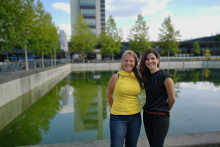Why did you decide to write this book?
Wijnmaalen: ‘During my PhD, I was surprised by a lot of things, so I decided to write them down. I’m convinced that the emotional part of a PhD doesn’t get enough attention. It is a cool adventure, but it can feel like a rough road sometimes. Many people quit and it is not because they are not smart. It is because a PhD is a very emotional process. In 2015 I wrote a sort-of book about my journey, but that was more of a throwaway leaflet that the UT later on handed out to PhDs. I decided to upgrade that leaflet into a fully-fledged book this year. Since I knew Julieta and her skillset, we decided to work together on this.’
'There is more to life than your PhD'
The book is quite a light read, both in length and style. Was that for a reason?
Wijnmaalen: ‘Definitely! The book should make people laugh, be more assertive and feel less lonely. A PhD is a very weird process. You’re not only completely invested in your research for four years or more, but life also happens along the way. A PhD often collides with a very hectic phase in people’s lives, including marriages, babies and buying a first house. I want them and people who are thinking about starting a PhD to realise that their own behind-the-scenes aren’t that different from those of others who are seemingly struggling less. This guide should feel like having an invisible friend.’
Matos Castaño: ‘When I read the text, I thought it showed a lot of empathy. It helps you relativize the process. During my PhD, my mother was always helping me to relativize my work. However busy or invested I was during my PhD, my mother always said to me: “Relax, you’re not Barack Obama, it is not the end of the world if you don’t get the results you hope for.” Of course she was right, but I didn’t always realise it at the time. Some PhDs have the tendency to think their work is the most important thing in the world. It is important. But there is more to life than your PhD.’
How did you decide which illustrations fitted best with the text?
Matos Castaño: ‘After reading the text first, I got a good sense of the style. Then we bounced some ideas and designs off of each other. And soon enough we had at least one illustration per chapter that we thought added value to the text.’
Wijnmaalen: ‘The process really became a give-and-take. One chapter is about talking at a conference and Julieta made a cartoon about someone giving a presentation in front of an almost empty room. I didn’t get it at first…’
Matos Castaño: ‘…But then I told Julia this literally happened to me once. Since most conferences run in parallel sessions, I once had the bad fortune of being scheduled at the same time as a famous scholar. There were literally two people listening to me.’
Wijnmaalen: ‘I thought this was such a good example of situations that can occur at conferences that I added this explicit example to the book.’

The book is also filled with subtle criticism about the academic world – and specifically supervisors. How come?
Wijnmaalen: ‘After our PhDs, we both left academics to become consultants. Now Julieta is doing a postdoc and I’m a visiting researcher. We loved the work, but there is room for improvement in the academic culture. Especially regarding the push towards productiveness, which leads to less thinking, less human contact and focus on personal branding. My hope is that this book gives people back some power. In a way, a PhD feels like an initiation ritual into the academic world. Your life depends on the professor’s judgement. But as a PhD student, you have more power than you think. Supervisors should ask themselves the question how they get the most out of us. That should be the starting point.’
Matos Castaño: ‘And they should enjoy the time they spend with you on research. It’s not an easy job, but we all get to be part of the same adventure. I think that’s something to cherish.’







